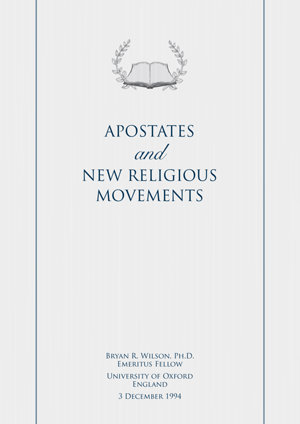CONTENTS INCLUDE:
ABOUT THE EXPERTISE
In this article from 1994, Professor Bryan Ronald Wilson briefly describes the history of apostasy—for instance in Roman Catholic and Protestant Christian churches—as a means to compare and contrast contemporary understandings of apostasy with respect to new religious movements. According to Dr. Wilson, apostates (ex-members) of new religious movements ought to be viewed with suspicion by academics and media outlets. “The apostate,” he explains, “is generally in need of self-justification. He seeks to reconstruct his own past, to excuse his former affiliations, and to blame those who were formerly his closest associates. Not uncommonly the apostate learns to rehearse an ‘atrocity story’ to explain how, by manipulation, trickery, coercion, or deceit, he was induced to join or to remain within an organization that he now forswears and condemns. Apostates, sensationalized by the press, have sometimes sought to make a profit from accounts of their experiences in stories sold to newspapers or produced as books (sometimes written by ‘ghost’ writers)…. Neither the objective sociological researcher nor the court of law can readily regard the apostate as a creditable or reliable source of evidence,” Dr. Wilson concludes. “As various instances have indicated, he is likely to be suggestible and ready to enlarge or embellish his grievances to satisfy that species of journalist whose interest is more in sensational copy than in objective statement of truth.”
BIOGRAPHY
Bryan Ronald Wilson, Ph.D., (1926–2004) was reader emeritus in sociology at the University of Oxford. From 1963 to 1993 he was also a fellow of All Souls College, Oxford, and in 1993 was elected an emeritus fellow. For more than fifty years he conducted research into minority religious movements in Britain, the United States, Ghana, Kenya, Belgium, Japan and other countries. Dr. Wilson earned his doctorate in sociology from the London School of Economics in 1955, authored dozens of articles, and wrote or edited dozens of books, including: Sects and Society: The Sociology of Three Religious Groups in Britain (1961); Patterns of Sectarianism (edited, 1967); Religious Sects (1970, also published in translation in French, German, Spanish, Swedish and Japanese); Magic and the Millennium (1973); Contemporary Transformations of Religion (1976, also published in translation in Italian and Japanese); The Social Impact of the New Religious Movements (edited, 1981); Religion in Sociological Perspective (1982); The Social Dimensions of Sectarianism (1990); and A Time to Chant: the Soka Gakki Buddhists in Britain (1994). In 1984, the University of Oxford recognized the value of his published work by conferring upon him the degree of D.Litt. In 1992, the Catholic University of Louvain, Belgium, awarded him the degree of doctor honoris causa. In 1994, he was elected a fellow of the British Academy.

Scientology, Social Science and the Definition of Religion
by James A. Beckford, Professor of Sociology, University of Warwick, England

Social Change and New Religious Movements
by Bryan R. Wilson,
Emeritus Fellow in Sociology, Oxford University

The Church of Scientology
by Juha Pentikäinen, Marja Pentikäinen, University of Helsinki, Finland

The Relationship Between Scientology and Other Religions
by Fumio Sawada, Eighth holder of the secrets of Yu-itsu Shinto, the oldest religion in Japan; President, Ahlul-Bait Center

The Religious Nature of Scientology
by Geoffrey Parrinder, Methodist minister, Professor, Comparative Study of Religions, University of London

Religious Philosophy, Religion and Church
by G.C. Oosthuizen, Professor of Science of Religion, University of Durban-Westville, Natal, South Africa

Scientology a New Religion
by M. Darrol Bryant, Department of Religious Studies, Renison College, University of Waterloo, Ontario, Canada

Apostates and New Religious Movements
by Bryan R. Wilson,
Emeritus Fellow in Sociology, Oxford University

Scientology: An Analysis and Comparison of its Religious Systems and Doctrines
by Bryan R. Wilson,
Emeritus Fellow in Sociology, Oxford University

The Reliability of Apostate Testimony About New Religious Movements
by Lonnie D. Kliever Ph.D., Professor of Religious Studies

The Sea Organization and its Role Within the Church of Scientology
by Frank K. Flinn Ph.D. Adjunct Professor in Religious Studies

Brief Analyses of the Religious Nature of Scientology
by J. Gordon Melton, Baylor University, Samuel Hill, Gary Bouma, Irving Hexham

Congregational Services of the Church of Scientology
by Bryan R. Wilson,
Emeritus Fellow in Sociology, Oxford University

Is Scientology A Religion?
by Alan W. Black, Associate Professor of Sociology, University of New England, Armidale, New South Wales, Australia

Is Scientology a Religion?
by Dean M. Kelley, National Council of Churches

Religious Toleration & Religious Diversity
by Bryan R. Wilson,
Emeritus Fellow in Sociology, Oxford University

Scientology A Religion In South Africa
by David Chidester, Professor of Comparative Religion, University of Cape Town, South Africa

Scientology: A True Religion
by Urbano Alonso Galan, Professor of Philosophy and Theology, Gregorian University of Rome

Scientology: A Way of Spiritual Self-Identification
by Michael Sivertsev, Moscow Academy of Sciences

Scientology: A Worshipping Community
by Lonnie D. Kliever, Southern Methodist University, Dallas, Texas

Scientology and Contemporary Definitions of Religion in the Social Sciences
by Alejandro Frigerio, Professor of Sociology, Catholic University of Argentina, Buenos Aires

Scientology and Islam an Analogous Study
by Fumio Sawada, Eighth holder of the secrets of Yu-itsu Shinto, the oldest religion in Japan; President, Ahlul-Bait Center

Scientology and Religion
by Christiaan Vonck, Rector, Faculty for Comparative Study of Religion, Antwerp, Belgium

Scientology: A Comparison with Religions of the East and West
by Per-Arne Berglie, Professor of History of Religion, University of Stockholm

Scientology Its Cosmology, Anthropology, System of Ethics and Methodologies
by Régis Dericquebourg, Professor of Sociology of Religion, University of Lille III, France

Scientology – Its Historical-Morphological Frame
by Dario Sabbatucci, Professor of History of Religions, University of Rome

Scientology: Its True Nature
by Harri Heino, Professor of Theology, University of Tampere, Finland

Scientology: The Marks of Religion
by Frank K. Flinn, Adjunct Professor of Religious Studies Washington University

